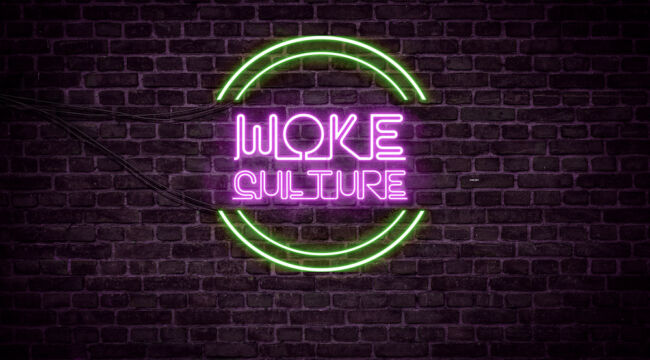The Lesser Rewriters of a Great Author
Good morning on this fine Thursday.
I bring news from my other adopted country, the United Kingdom.
You may know I lived in London for nearly ten years and consider myself a cultural Anglophile. (But not a political one; the British polity lost the plot ages ago.)
The UK is the home of European Woke, especially London. If you think Prince Harry (that ginger idiot) is a one-off, you’d be wrong. He was just easy pickings for a C-list actress with ambition.
England suffers from what I call “Empire Regret.” It obnoxiously bends the knee to any group, whether they’re rightly offended or not. In short, it presents solutions to problems that don’t exist.
So this insane happening fits right in with the demolition of once great British values.
Let me explain…
“Put it back on the wall.”
Old London Business School classmates Aussie Trav, English Will, and The Yank (that’s me) decided to take a weekend trip to Oslo in 2004, two years after we graduated.
We had flown from London, hopping the North Sea, and landing in Oslo on a Friday night.
It was late August. Oslo is gorgeous, pleasant, and temperate at that time of year. We loved it.
We couldn’t believe how expensive beer was, though. It was 10 – that’s British pounds, not dollars – for a drink that was smaller than a pint.
But I must say… we didn’t care!
We decided to live it up a little bit and enjoyed wonderful nights out on the town.
To excess, per usual.
So Sunday, before we were due to leave, we decided to walk around the museums to get rid of our hangovers – looking at pretty paintings at least lessens the thumping in your head.
There I was, staring at The Scream by Edvard Munch.
Honestly, I wasn’t all that impressed… just a couple of swirls of paint.
But then I received a fateful text message. In those days, texts came in on my trusty Nokia.
My buddy, Malcolm, wrote from London: “Put it back on the wall.”
I thought nothing of it as I was wandering around aimlessly in the museum, trying to get rid of my headache.
We left Oslo that night.
The following day, I had to get up early to go to work.
On the Tube, I read that morning’s newspaper. And as I was thumbing through it, one headline read “The Scream Stolen in Oslo.”
I was shocked. I was standing right in front of it! Suddenly, Malcolm’s text made sense.
At the time, I didn’t know there were four Screams in existence; Munch had painted two and did two of them in pastel.
That Sunday, armed robbers stole the version in the Munch Museum as I stared at another one in the National Museum!
I often think of what I’d have done if the pilferers tried to take the one I was looking at.
If I close my eyes, I can still feel that hangover. I’d like to think I was in such a bad mood, I would’ve beaten the stuffing out of them.
But who knows?
The real question I’ve always had for these people is, “Who the f*ck do you think you are?”
Before I expand on that, let me give you some advice on collecting that some smart old men gave me.
Umberto Eco’s Antilibrary, by Nassim Taleb
There’s nothing I love more than strolling around old bookshops.
In Europe, there are some that’ve been around for hundreds of years. Whether it’s Shakespeare and Company in Paris, Hatchard’s in London, or Libreria Luxembourg in Turin, there’s nothing that connects me with the past better than they do.
I always try to buy something whenever I go. I feel it’s partly my responsibility to spend the money to best make sure those book stores remain open.
Of course, that’s led me to accumulate quite a library, most of which is still in Cebu waiting for us to ship to Italy.
I haven’t read all the books. But luckily, the polymath and philosopher Nassim Taleb gave me some fantastic confirmation bias in his classic, The Black Swan:
The writer Umberto Eco belongs to that small class of scholars who are encyclopedic, insightful, and nondull. He is the owner of a large personal library (containing thirty thousand books), and separates visitors into two categories: those who react with “Wow! Signore professore dottore Eco, what a library you have! How many of these books have you read?” and the others — a very small minority — who get the point that a private library is not an ego-boosting appendage but a research tool.
Here’s the important part:
Read books are far less valuable than unread ones. The library should contain as much of what you do not know as your financial means, mortgage rates, and the currently tight real-estate market allows you to put there. You will accumulate more knowledge and more books as you grow older, and the growing number of unread books on the shelves will look at you menacingly. Indeed, the more you know, the larger the rows of unread books. Let us call this collection of unread books an antilibrary.
Oh, I was never going to stop buying books. But from the time I read that, I’ve never felt guilty for leaving them on the shelf.
Roaming Around Ayala Cebu
Alas, the Philippines doesn’t have as many old bookshops. So when I was roaming the National Bookstore as a new father, I was thrilled to find a complete set of Roald Dahl books.
I bought the lot of them, though I knew it’d be years until Micah could read them.
I’d simply add them to our antilibrary, waiting for the right moment to get Micah to pick them up and read.
Unbeknownst to me, there was a far more important reason to stock up on Old Dahl.
How Dare You?
The Daily Telegraph broke the story with the headline “The Rewriting of Roald Dahl.”
I thought it was a joke.
But according to The New York Post:
“Words matter,” begins the notice at the bottom of the copyright page of Puffin’s latest editions of Roald Dahl’s books.
“The wonderful words of Roald Dahl can transport you to different worlds and introduce you to the most marvelous characters. This book was written many years ago, and so we regularly review the language to ensure that it can continue to be enjoyed by all today.”
Perhaps because I write, I find it more offensive.
Or maybe because I live within spitting distance of objet d’art, which I wouldn’t even touch with gloves on.
It’s not theirs to change, regardless of intellectual property laws.
And I can’t imagine Dahl, were he alive, would have agreed with this.
The Telegraph followed up with an article today where Puffin, a publisher with whom I will never deal, stated they have a “significant responsibility” to protect young readers.
No, you don’t.
You have a responsibility to get your merchandise out, unspoiled.
I’d prefer they be honest and say, “Well, we think we’ll lose business keeping the old language, so we’re trying this out.”
Loathsome though it is, it’s still better than dressing this absurd censorship up as a caring activity.
As HL Mencken once said, “The urge to save humanity is almost always only a false face for the urge to rule it. Power is what all messiahs really seek: not the chance to serve. This is true even of the pious brethren who carry the gospel to foreign parts.”
Here are some of the changes, courtesy of the National Review:
In the original James and the Giant Peach, a character rhymes, “Aunt Sponge was terrifically fat / And tremendously flabby at that,” and, “Aunt Spiker was thin as a wire / And dry as a bone, only drier.”
With the new changes, the old verses now read: “Aunt Sponge was a nasty old brute / And deserved to be squashed by the fruit,” and, “Aunt Spiker was much of the same / And deserves half of the blame.”
The famous glutton Augustus Gloop in Charlie and the Chocolate Factory is no longer introduced as “fat” but rather as “enormous.” In The Twits, Mrs. Twit used to be described as “ugly and beastly” but is now only “beastly.”
Gendered references have also been weakened so as not to be deemed offensive to women or the transgender community. In The Witches, a section musing that witches are bald beneath their wigs has the new disclaimer: “There are plenty of other reasons why women might wear wigs and there is certainly nothing wrong with that.”
Matilda‘s Miss Trunchbull, the ferocious fictional headmistress of a school, formerly a “most formidable female” is now a “most formidable woman.”
In Charlie and the Chocolate Factory, Oompa Loompas, once called “small men,” are now “small people”. The Cloud-Men in James and the Giant Peach are now Cloud-People.
Prose that might be tangentially misconstrued as being culturally insensitive also appears to have been removed. In The BFG, the main character giant no longer wears a “black” coat and characters don’t turn “white with fear” anymore.
I’m turning red with rage!
You Can’t Even Blame the Government
The worst part is that His Majesty’s Government slammed the changes.
I can’t even blame the State!
Puffin and the Roald Dahl Story Company worked with some company called Inclusive Minds, which is dedicated to “inclusion and accessibility in children’s literature.”
How about we get the kids to actually read first?
There’s nothing more regrettable than private censorship.
Theseus’ Ship
Am I being paranoid?
I don’t think so.
Let’s talk about Theseus’ Ship.
From The Life of Theseus by Plutarch, via Britannica:
The ship wherein Theseus…returned [from Crete] had thirty oars, and was preserved by the Athenians down even to the time of Demetrius Phalereus [died c. 280 BCE], for they took away the old planks as they decayed, putting in new and stronger timber in their place, insomuch that this ship became a standing example among the philosophers, for the logical question as to things that grow; one side holding that the ship remained the same, and the other contending that it was not the same.
If you replace enough of Dahl’s words, when do the works cease to be Dahl’s?
That’s why I am so thrilled the reaction to this incredible breach of trust has been nothing short of nuclear.
It seems both the left and the right are outraged. And that’s an excellent thing.
As for me, I’m so glad I bought Micah’s copies before they violated Dahl’s works.
He’ll get the farm-fresh, free range, organic Dahl… as all children should.
Oh, and the stolen version of The Scream found its way back home in 2009. For all to see, for the price of a ticket to Oslo.
If you have any feedback or topics you want covered, be sure to click here and drop me a line.
Until next week!



Comments: